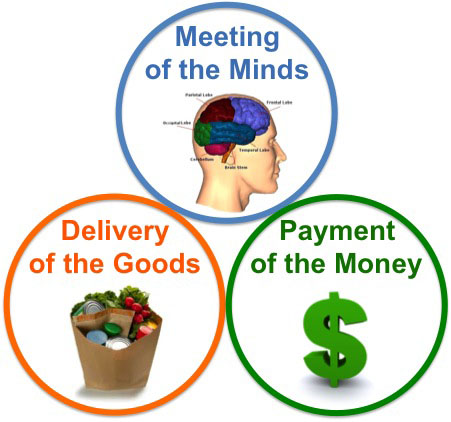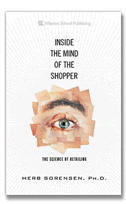With this issue of the Views I offer a broader view of retailing than is perhaps common. But I think it is important, because too many times there is a failure to appreciate the grandness of the enterprises we pursue. My hope is to energize and inspire many with a greater appreciation for their own work, and for that of their partners in what could be the greatest endeavor ever undertaken amongst us.
So let's begin at the beginning. Supposing there are only two people on earth, who must now do everything for themselves. If these two people are A and B, then A must do for A and B for B, except when A is doing for B, or B for A. They would have to be real dunces to not soon recognize that through natural abilities and inclinations (both important,) A is better at some things and B is better at others. This means that things will be a whole lot better for both if they cooperate, than each being only for themselves. This being better for both is because through cooperation, this one plus one pair is more efficient than just one plus one, individually. That is, 1 + 1 + cooperation is greater than 2.
It is important to recognize that efficiency is the fundamental driver of prosperity. Efficiency is what makes the 1 + 1, more than 2. But it is worth also recognizing, that when A and B are free to pursue their own interests and abilities, the acceleration of efficiency of the A plus B duo will almost certainly be optimized for that pair.
Now, what we have outlined here is the important economic principle of the division of labor. That is, let the boot maker make boots for all in the village, who prefer to delegate that activity, so that they may be more productive doing something else that they are better at. So the fundamental principle driving efficiency for two is the very same for two or twenty billion. And, leaving aside the mechanics for the moment, every increase in the number of participants in this "division of labor" scheme, willy nilly, leads to increases in efficiency for the total population.
The very concept of the division of labor, the driving force of efficiency and prosperity, requires a mechanism for the exchange of production, otherwise known as "the market!"
The Three Components of "The Market"
Once we move past small numbers of members of the population, exchanging production amongst the members leads to three fundamental functions to address the three fundamental and necessary components of efficiency of the market. The first and single most important of the three is, always has been, and always will be, the mental connection between producers and users. In a modern market where there is an abundance of options for the buyer to select from, simply getting products to the customer, and receiving payment from the customer, both essential components of retail, are of subordinate importance to the "meeting of the minds," the mental process of closing the sale.

There is no efficiency contributed to the village if no one knows who and where the boot maker is. In a village, this may be common knowledge, but in a large market there will be many boot makers, and each may affix identification (a brand) on their product, accepting/claiming responsibility for its production. This brand can be a major assist in communication between a producer and a consumer/user.
Let's think more closely about this process of "communication," which begins with introduction of the product to the customer (whether by advertising or in person) and culminates in what is known to classical salesmen as "the close." [See: "How to Close Every Sale" (Commentary on Joe Girard's book).] In law, this point of "close" is known as the meeting of the minds, and means that the sale has been completed, mentally, with agreement between the buyer (customer) and the seller of the goods.
This mental process, beginning with "introduction" and culminating in "the close," is the first and foremost requirement of an efficient market, so that not only may each person produce what they produce best, but consumer-users may intelligently select from an array of offerings what suits them best! The ultimate purpose of the communication is to efficiently lead to a meeting of the minds between the buyer and seller. The buyer seeking their own needs and wants, on the one hand, and the seller seeking to meet the individual and multifarious choices of their customers.
Campaigns and Voting
Everyone knows about advertising campaigns, but perhaps didn't connect them to the political process which also has a "closing the sale" component, in that case the casting of ballots. Perhaps you hadn't thought of money as ballots, but it really is. Every dollar spent is a "vote" for something. In that sense, the payment of money and delivery of goods are the consummation of the meeting of the minds. Essentially, the outgrowth of what happened in the mind of the buyer that led to acceptance of the offer of the seller.
Once we see this connection, conceptually, between the political process and the commercial process of selling, it is easy to see how markets cater to customers' free choice, through competition - much like political competition. Thus, the operation of "free markets," becomes essentially a "Trojan horse" for political freedom. That is, a population that becomes accustomed to "voting" every day, for what they want, with their commercial "ballots," money, just naturally absorb free choice as a given right.
This is a key to understanding the explosive force of freedom, peace and prosperity across the world. In times of economic turmoil and stress it is easy to lose sight of the bigger picture: growing freedom and prosperity. And it is easy to overlook the role that retail plays in this. Remember, retail IS the final mile in free enterprise commerce. And it is pursued with great vigor today, even in places not famous for freedom, but that are increasingly enjoying it as a necessary component of prosperity. The argument is OVER globally, (except in calcified brains,) prosperity comes from trade - retail in the van.
This is one huge reason, that other than in the overblown press, peace is flooding the world. There is plenty of data proving this little recognized fact. If you want to check this out, maybe start with the United Nation's sponsored Human Security Report, or get the book, The Birth of Plenty, by William Berstein. Or maybe Pinker's The Better Angels of Our Nature, [Bill Gates' favorite book of the last decade]; or Seabright's The Company of Strangers. [Thanks to my colleague Wendell Krossa for these important economic references.] But to summarize the principle simply, only a total idiot would kill his own customers! This is the basic reason that growing commerce leads to growing peace - and cooperation, the plus factor in that 1 + 1 equation.
Notice though, that growing commerce REQUIRES that shoppers have the freedom to select what they choose, and vote for those items that meet their needs best - from their point of view. This is, of course, at the retail level. But the principle works right back up the supply chain, all the way to the producers of the commodities used to fulfill the needs and desires that the people choose.
Isolationism will NOT work, because of the basic principle of 1 + 1 = more than 2. Even when the numbers get into the billions, productivity increases. We will address the reason for that shortly, but first note that any player or country who isolates themselves, to any extent whatsoever, is doomed to fall behind the larger group that works in cooperation - free trade. The economic engine that guarantees this does not necessarily work in the short term, but it will always work in the long term.
Cartels and managed economies are doomed in the long term. The reason is that no one has ever found a way to build an impenetrable wall around creativity. Creativity can be encouraged, but not controlled. This is because creativity, by its very nature, begins with an idea in the mind of someone. Others may have similar or related ideas, and ideas of themselves are worth nothing if not activated. That activation requires, usually, some single-minded focus and overwhelming effort by the creator. Overwhelming, at least in the sense of overcoming obstacles that usually impede the fruition of the idea.
Steve Jobs creation of the iPhone is a good example of the workings of creativity. Given the production of the iPhone in China, one might reasonably wonder, why wasn't it created by someone in China? No one can say for sure, especially with modern communications, and the assumption by many that the world has been flattened through communications. However, the world is NOT flat, in terms of creativity. In fact, The World is Spiky. This is because our 1 + 1 example doesn't say just how much more the 2 will be, and clearly there are interactions, social, business and political environmental effects that may encourage or discourage creativity.
Although the five times greater population in China than in America, means that China has five times greater creative potential (the "more than" factor,) activating that potential requires a culture of freedom, of thought, behavior AND commerce. It has nothing to do with something inherently more creative in Silicon Valley than a Bamboo Forest. With development and adequate free trade, the view for global prosperity can be nothing but positive. As Rupert Murdoch recently commented, "Even the so-called Communists in China have come around to the view that Adam Smith is a more reliable guide for a nation than Karl Marx or Chairman Mao."
Another Australian, Harvey Norman has noted that business trumps government when it comes to the economy. He cites the growing global positive moves of the economy and notes: "People are saying that if you can get rid of the government it will help, but I don't think it's going to make any difference either way. Once the wave [of prosperity] starts it's hard to stop."
This brings us back to our observation that it is efficiency that drives prosperity, and retailing is the linchpin of efficiency in global commerce. Many have failed to notice that it is not the decisions of the few (the governments,) who control freedom and prosperity. In reality, it is the decisions of the many (the populations,) expressed most often and most personally at retail, that moves societies forward. This is the way that retail serves as the Trojan horse of freedom and prosperity. I'm with the people, the mass of voting shopper people, wherever they may be. How about you Mr/Mrs/Ms Marketer?
Here's to GREAT "Shopping" for YOU!!!
Your friend, Herb Sorensen



